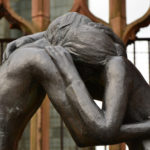We run our website the way we wished the whole internet worked: we provide high quality original content with no ads. We are funded solely by your direct support. Please consider supporting this project.

Why God Made You
The life God has for each one of us is a life of perfect love, one that eternally unites us with the Father, Son and Holy Spirit. This is why God made us. It’s what we long for, to love and be loved.
However, things like the love of the Trinity are not part of our normal language. So let’s unpack this a bit.
The great pastor and theologian Jonathan Edwards painted a portrait of the Trinity in which the love and joy of the three divine persons was so full and intense, it simply could not be contained. God’s fullness thus yearned to be expressed and replicated by sharing it with others. So this fullness overflowed as God brought forth a creation that mirrored his triune beauty.
The pinnacle of this creation is human beings, those who reflect, in a small way, the yearning to participate in the love of the Father, Son, and Holy Spirit.
The God of overflowing love longs to pour his love into others, so he creates beings that long for his love to be poured into them. This is why you were created. However, because of our rebellion, living without the fullness of God is a reality that shapes our daily lives.
It’s a state that is completely unnatural, an emptiness that points to our true purpose.
Jesus reveals this purpose when he prays to the Father that his disciples and “those who will believe in me through their message” would be “one as we are one.” (The entire prayer can be read in John 17.) Then he prays that he would be in us in the same way that the Father is in him. God apparently wants the loving unity of his own triune being to be replicated in the way we relate to one another as well as in the way he relates to us and dwells in us.
Then Jesus proclaims to the Father that he “will continue to make you [the Father] known in order that the love you have for me may be in them and I myself may be in them.” And he essentially says the same thing when he says to the Father, “I have given them the glory that you gave me” for the “glory” that the Father gives the Son and that the Son shares with us is simply the weighty, brilliant radiance of the self-giving love of the three persons of the Trinity.
This means that God’s ultimate goal in creation is nothing less than for the very same perfect love that the Father has for his own Son to be given to us and to be placed within us.
We become the recipients of the Father’s eternal love for the Son because we are in the Son as he is perfectly loved, and the Son is in us, as he is perfectly loved.
This is the true life that we created to experience. It’s what we thirst for. And nothing else, no other purpose, can quench it. While some of us may be blessed with loving people in our lives, with worthwhile work, and with some measure of security, no one, and nothing, could come close to meeting this need.
Only God can satisfy your longing for perfect, unconditional love, unsurpassable worth, and absolute security.
—Adapted from Benefit of the Doubt, pages 58-60
Photo via Visual hunt
Related Reading

How God Changes the World
God’s hopes for us began before the creation of the world. And what God intended from the beginning gives us insight into how God works to bring about what he intends. In the first chapter of Ephesians, Paul teaches that God “chose us in [Christ] before the creation of the world to be holy and…

The Only Thing That Matters Is Love: The Kingdom of God (Part 3)
To say that living in Calvary-quality love is the most important thing in our life is to grossly understate its importance. This stands in distinction from how we typically define the Kingdom of God. But it stands in line with the fact that Jesus is the Kingdom of God. Paul says the “the only thing…

Crucified Transcendence
If our thinking about God is to be faithful to the New Testament, then all of our thinking about God must, from beginning to end, be centered on Christ. I’m persuaded that even our thinking about God in his transcendent, eternal state should begin and proceed with the Pauline conviction that we know nothing “except…

The Coming Kingdom & Racial Conflict
In the book of Revelation, we see a glimpse into the future. John says he saw, …a great multitude that no one could count, from every nation, tribe, people and language, standing before the throne and in front of the Lamb. They were wearing white robes and were holding palm branches in their hands. And…

From Good Friday to Easter
This weekend as you contemplate the suffering, death and resurrection of Jesus, we pray that God will reveal his unfathomable love for you in new ways. Blessings to all of you from all of us at ReKnew. Photo credit: Claudio via Visualhunt / CC BY

God’s Aikido Way of Defeating Evil
Greg continues his thoughts on the atonement with this installment highlighting the way God uses the evil intentions and actions of his enemies to bring about good. And because this strategy is based in love, the demons who encountered Christ could not possibly imagine what he was up to. They ended up participating in their…
